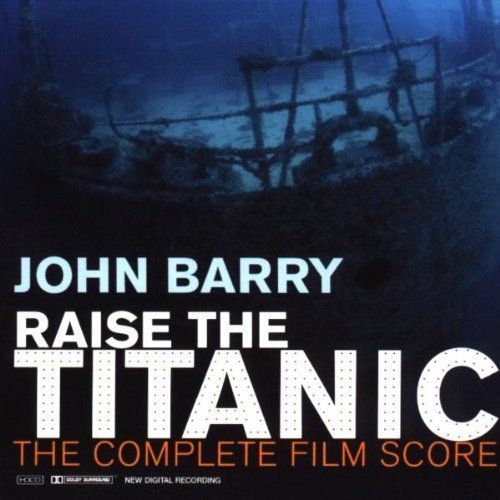Raise the Titanic

Label: Silva Screen
Catalogue No: FILMCD 319
Release Date: 28-Jul-1998
Total Duration: 50:22
UPN: 5-014929-031927
City of Prague Philharmonic Orchestra conducted by Nic Raine
RAISE THE TITANIC is often misleadingly referred to as a film of the disaster genre, when in fact the only incident of fatal jeopardy in the entire movie occurs when a single submersible implodes while searching for the sunken liner. Sad for the crew, yes – but hardly a major disaster. There is no doubting, of course, the disastrous nature of the tale that inspired this 1980 film, which is in reality a silly Cold War drama with the great and tragic ship relegated to a cheap plot device about carrying a rare mineral to power a secret US defence system. It is perhaps a mark of how ludicrous this basic notion is that the film still remains one of cinema’s most critically reviled and least commercially successful — at its time of release, producer Lew Grade solemnly declared that “it would have been cheaper to lower the Atlantic”.
One aspect where praise has been almost universal is for John Barry’s score – released at last. Perhaps the almost legendary nature of the RAISE THE TITANIC score stems from the fact that the film has one of the finest main themes of any film I can remember. Barry’s depiction of Titanic is always one of opulence and majesty, his layers of brassy fanfares and lush, sweeping strings eschewing her tragic story to reflect her grandeur and artistry. The film’s opening montage of photographs set to this theme can’t help but move all but the hardest of hearts. Even when the vessel finally surfaces, rusted and decaying, Barry lends a level of triumph that helps the audience forget some especially unconvincing effects work. This is one instance where film music does make the mundane transcend to brilliance.
However, this theme is hardly the only notable thing about the score, the larger part of which has Barry return to his 007 roots. His eerie, low-key strains aptly evoke the metaphorical murkiness of the politicians behind the scheme, and then later the more literal murkiness of the Atlantic. Most of his music in RAISE THE TITANIC is quite dark and disturbing, albeit still very melodic (a Barry speciality). Some minor devices add little bits of color here and there – a sprightly hornpipe for Cornwall, an ominous clicking motif for the Sicilian Defence weapon, and an aggressively defiant march for the arrival of the US submarine sent to defend the newly raised ship. Perhaps the most significant secondary motif is Barry’s lament to those souls lost when Titanic sank, an introspective and sorrowful tune for piano and saxophone which links the memories of a survivor with a later scene where the White Star banner is flown on the ship one last time. Beautiful.
As for this particular recording, both sound and performance are first rate – simple as that. As we’ve come to expect from Silva, the orchestra’s sound is especially rich and clear. Sometimes rerecordings can be hit and miss, but in this instance Mc Raine (Barry’s former orchestrator, who also painstakingly restored the score) rarely misses a trick. In the case of nearly all tracks, you could just as easily be listening to the real thing. David Wishart provides detailed track by track notes, and mention has to be made of Cohn Parker’s elegant and restrained design too, with a superb use of typography and colour. Without a doubt this is one of Silva screen’s finest releases to date.
Gary Kester – Originally published in Soundtrack magazine Vol.18 / No.71 /1999



